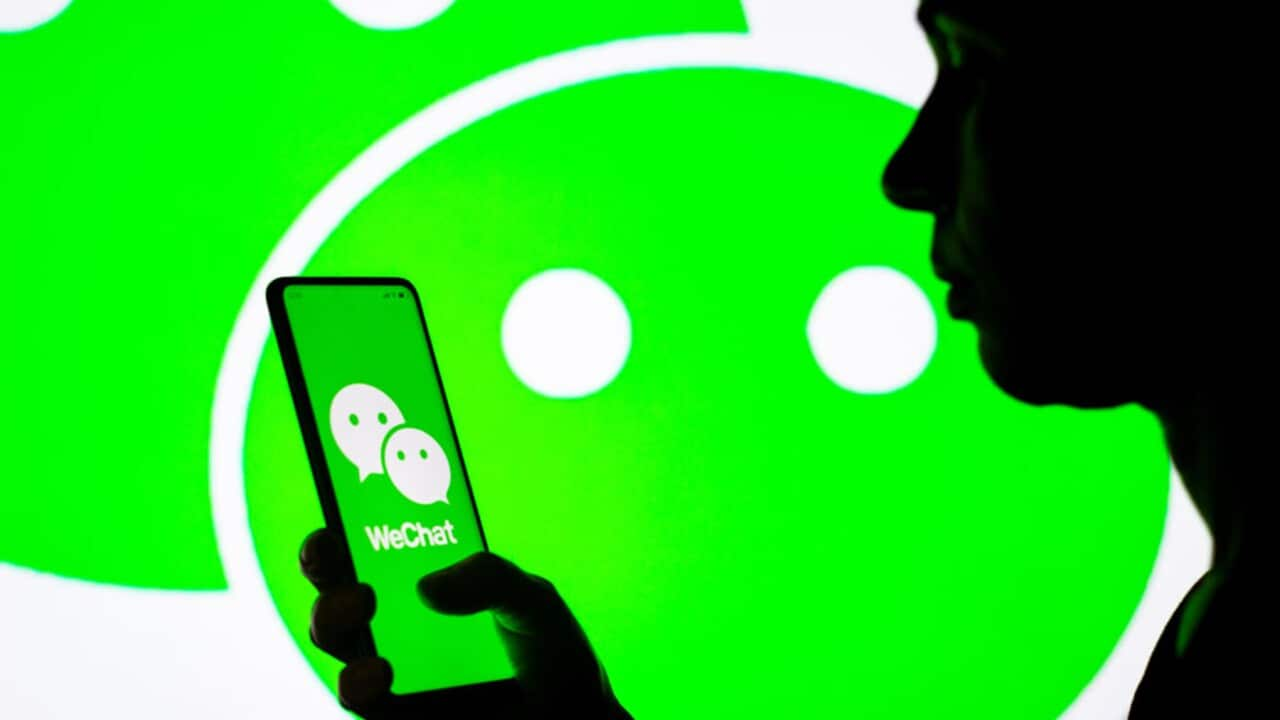Italian
Mentre la stragrande maggioranza di utenti di WeChat vive in Cina, la app è molto diffusa all’interno della diaspora cinese.
Fan Yang, che è arrivata a Melbourne dalla Cina otto anni fa, sta facendo una ricerca sugli usi di WeChat in Australia.
"WeChat contains payment function chatting, function, socialisation, function, networking function, comm content, publication. WeChat even monopolise Chinese people's lifestyle, in a sense that everyone who's conduct their activity work related activities on WeChat"
WeChat si è anche dimostrata molto popolare tra i politici australiani, perché molti di loro sono interessati a comunicare con i membri della comunità cinese in Australia, che conta più di un milione e 200 mila persone.
Alle ultime elezioni federali, i candidati hanno creato profili ufficiali, hanno fatto circolare video fatti appositamente per la app, ed hanno anche partecipato a sessioni dal vivo con l’audience.
Ma la disinformazione è circolata velocemente. Storie false come quella secondo cui i laburisti avrebbero concesso la residenza permanente a tutti i rifugiati sono state visualizzate decine di migliaia di volte.
Daria Impiombato, un’analista dell’Australian Strategic Policy Institute, ha detto che, come Facebook o Youtube, la causa principale della disinformazione è il profitto proveniente dalle pubblicità, e che è difficile identificare la portata e l’origine delle false notizie.
"WeChat, is a hybrid app. It has official accounts that can post on a feed, and they act a little bit like Facebook, public pages, but then a lot of the conversation actually happens in private group chats that are really, really difficult to analyse."
La app di proprietà cinese è stata a lungo criticata per aver censurato i propri utenti.
Mentre Tencent -la compagnia a capo di WeChat- ha confermato che il contenuto degli utenti internazionali è privato, una ricerca precedente di Citizen Lab, una azienda canadese di analisi dei dati, ha rivelato che la sorveglianza politica delle comunicazioni include anche gli utenti che vivono al di fuori dei confini cinesi.
Lo stesso primo ministro australiano aveva denunciato la censura dopo aver perso il suo profilo ufficiale lo scorso anno, profilo che è stato rinominato “Australian-Chinese New Life”.
Ma alcuni esperti pensano che questa cosa sia improbabile.
WeChat è in realtà due app in un sistema, Weixin per gli utenti in Cina e WeChat per tutti gli altri.
Scott Morrison si era procurato un profilo ufficiale, disponibile solamente sulla versione Weixin, che gli ha dato dei vantaggi come quello di permettergli di mandare avvisi illimitati ai suoi seguaci.
Ancora Daria Impiombato.
"It was owned by a man in China's Fujian Province, because you need to have a Chinese phone number to set up an official account on Weixin. And that was always a risk that the prime minister's office was aware of. So it could have been that the man just decided that the risk of running that account for a foreign politicians was not worth the reward anymore."
Tencent ha detto in un comunicato ad SBS News che "proibisce la presenza sulla piattaforma di contenuti di promozione politica, incluse pubblicità elettorali a pagamento” e che il loro obiettivo è quello di “minimizzare la disseminazione di notizie false e di disinformazione”
Nonostante questo, una rapida occhiata della app mostra che i contenuti elettorali sono presenti.
English
While the vast majority of WeChat users live in China, the app is extremely popular with the Chinese diaspora.
Fan Yang, who arrived in Melbourne from China eight years ago researches how it's used in Australia.
"WeChat contains payment function chatting, function, socialisation, function, networking function, comm content, publication. Wechat even monopolise Chinese people's lifestyle, in a sense that everyone who's conduct their activity work related activities on WeChat."
It's also proved popular with politicians because many are eager to engage with the more than 1.2 million people in the Chinese-Australian community.
At the last federal election, candidates created official accounts – circulated videos tailored for the app, and even ran live Q&A sessions.
But misinformation ran rampant. False stories such as Labor allowing all refugees permanent residency were viewed tens of thousands of times.
Daria Impiombato, an analyst at the Australian Strategic Policy Institute says, like Facebook or Youtube, the main driver of misinformation is advertising revenue and it is also difficult to identify the scale and source of fake news.
"WeChat, is a hybrid app. It has official accounts that can post on a feed, and they act a little bit like Facebook, public pages, but then a lot of the conversation actually happens in private group chats that are really, really difficult to analyse."
There's also another concern that the Chinese-owned app has long been criticised for censoring its users.
While Tencent - WeChat's parent company - says all content among its international users is private, prior research by Citizen Lab - a Canadian analytics company - found that political surveillance of communications affects users beyond China's borders.
The Prime Minister himself called out censorship after he lost his official account last year, which is now rebranded to "Australian-Chinese New Life".
But some experts believe that's unlikely.
WeChat is actually two apps within one system - Weixin for users in China and WeChat for everyone else.
Scott Morrison had procured an official account, only available on the Weixin version - which gave him perks such as allowing him to send unlimited alerts to followers.
Daria Impiombato again.
"It was owned by a man in China's Fujian Province, because you need to have a Chinese phone number to set up an official account on Weixin. And that was always a risk that the prime minister's office was aware of. So it could have been that the man just decided that the risk of running that account for a foreign politicians was not worth the reward anymore."
Tencent told SBS News in a statement that it: "...prohibits promotional political content, including election-related paid advertising on the platform... and that it’s “committed to... minimising the dissemination of false news and misinformation."
But just a quick scan of the app shows that campaign content is being distributed.
Report by Lin Elvin




